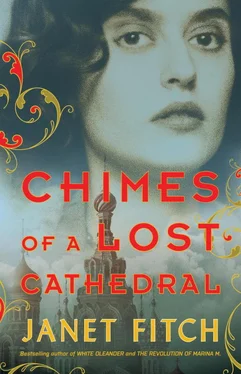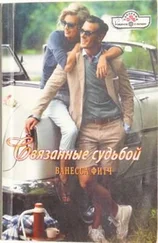I must produce this engine fine
So the trains will run, and the peasants down the line
Will get their scythes, their hammers and harrows.
But so little food, the rations get smaller all the time.
Another, holding a hammer with a hand that honestly looked like it had never held so much as a can opener:
I don’t know why the worker must starve.
We’re the ones who unseated the tsar.
We braved the bullets in ’17.
We gave them the revolution.
But all we have is a heel of bread.
Who is it starving the nation?
In the next scene, we saw who. A fat peasant family, their clothes stuffed with straw, ate away at a huge loaf of bread, bags of flour piled in the corner. The kulaks. I hated this black-and-white simplification. Of course the peasants were hoarding. It was inevitable. When people didn’t know what the future had in store, naturally they held back. When the detachments paid nothing, when the peasants couldn’t buy anything they needed, who could blame them for hoarding? But on the other hand, the workers were starving—that was true as well. Scarcity, setting city against country. How were they going to solve that with caricatures and antics?
A knock on the izba door—the speculator. Boos from the audience as he bought a huge bag of flour, and the conspirators drank a glass of vodka all around.
A second knock on the door. The Committee of Poor Peasants, in their rags. “Go away!” the fat peasant called out, as the family scrambled to hide the grain under the tablecloth. The committee threw their shoulders against the door as the peasants on the other side resisted them. Finally, they knocked the paper door down, as well as the wooden doorframe it hung from. All around me, people laughed and cheered.
A big peasant from the committee pushed to the fore. Beard or no beard, I would know him anywhere.
All around me, the crowd yelled to the big man, “It’s under the table!” “They’re hoarding, the kulaks!” “They sold it to the bagman!” “They had plenty enough for that rascal, didn’t they?”
How well my husband looked. Well fed and strong, grown up—so much less unformed than he’d been on another platform, before another train, when he’d fled to Moscow with that little mink Zina Ostrovskaya.
“Who gave you the land?” he boomed. “Who got rid of your master?”
I couldn’t believe he was here, just a few yards away, wearing that ridiculous beard. Planting himself across the stage like a tree. The kulak wife simpered, tried to distract him, arching her back, twirling her braid. She reminded me of Faina.
His rich voice rolled like a train.
In the year ’17,
It was us, not God, who gave you this land.
The poor, the worker, the soldier.
Now your brother workers are dropping from hunger
On the front, your brothers are fighting for you,
Keeping Kolchak from your hut and your wife.
Do your part, peasants!
Be part of the new world!
“Watch him!” the crowd yelled. “Watch him, now!”
The short, tubby kulak husband began sneaking out with a bag of grain over his shoulder. Genya seized him under one arm and lifted him off the ground as his legs ran in the air. The crowd roared with laughter. The Red Army soldiers came in, and Genya and his peasants handed over the kulak and the grain, and then everyone sang “The Internationale,” arms resting on one another’s shoulders.
All the things this man meant to me. I took off my scarf. I was not afraid for him to see me—huge, cornered, having made every bad decision. I wasn’t the girl he’d met at the Cirque Moderne, but he wasn’t that boy either. Where was my art, my beauty, my love? I’d taken my choices all the way, and this is what it had come to—a barefoot bride about to have a baby in a railway town.
“Comrades,” Genya spoke to the crowd. “The revolution is in your hands. The army needs to be fed if they’re to protect you from the Whites. The workers can’t make guns, they can’t repair trains, if they’re starving. Everybody must pay his share. There’s no yours or mine now, only ours. Long live the Soviet Socialist Republic!”
The roar of the people. “Up with the Soviet!”
“Down with speculation! Food for the workers!”
Yes, people needed to be reminded that the land was only theirs by virtue of the revolution, and it could be lost as well as gained. If this agit-train couldn’t do it, I didn’t know what could.
Now people moved down the platform toward the doors of the People’s Kinotheater. I watched Genya edge his way up toward a car painted with a rising sun. I began to push my way toward it. But now I saw Styopa, scanning the crowd for me. Quickly, I tied my kerchief back on—peasant style, under the chin, hiding my face—and traced a half-circle around him, my eyes on the car into which the actors had retreated. Keeping my head down, I marched up to one of the carriage doors where three soldier-actors lounged, smoking. Or were they real soldiers?
Oh yes, I recognized that air of threat, the joking potential for violence.
“I have to see Gennady Yurievich,” I said, gripping the handhold, but a soldier pushed into my path, blocking my way.
“I bet you do, little mother. All the ladies want to meet him. He’s a regular Chaliapin.” His ugly face close to mine, leering.
“Tell him Marina is here.” My spine straightened, I had not made it this far to be wiped off like mud on one’s boots. But the soldier made no move, just leaned against the car like a man outside a tavern. “Go tell him! He’ll want to know.”
“Which Marina?” the soldier drawled. “Camp-follower Marina? Maybe that’s a bomb under there.” He tried to lift my skirt with his rifle. The others laughed as I slapped it down.
“Kuriakina,” I said sharply. “Quick! I don’t have much time.” My heart thudded like a perch in a bucket, my breath tight with what room the baby had left for my lungs. My heartburn flamed. Oh, hurry, Comrade Son of a Bitch! I glanced around for Styopa. Finally, the soldier with his knobby forehead retreated into the depths of the car. The others watched curiously.
A moment later, down the platform, Genya burst from the last door of the car like a man hurtled by an explosion. He shoved his way through the people who wanted him to stop and talk to them, fighting his way through to me, and then his arms were around me, lifting me into the air. He was crushing the baby.
“Stop, Genya!”
That’s when he realized something had grown between us. He put me down, backed away from me, and now he could see how it was. My belly, my ragged clothes, my bare feet, my hollow cheeks, the wear of sleepless nights.
He came back and embraced me tenderly, his head on top of mine. He remembered me. I was saved.
“Whose is it?” he whispered.
Oh God, not that. I was sick to death of lying. What did I do every day from sunup to bedtime? It made my very bones hurt. “It’s mine,” I said defiantly. “Please don’t ask me anything more.”
We gazed at one another. God, please give me another chance, I prayed. Could he see my desperation? I needed him. Help get me out of this place. I glanced behind me, searching for my benevolent dictator, my relentless Tikhvin husband. “Can we go inside?”
He hesitated just a moment, unsure, knowing from experience that I wasn’t to be trusted, and yet longing for me just the same. That hadn’t stopped. He led me by the hand into the carriage, past the skeptical soldiers, who now stepped back, tipping up the brims of their caps the better to see and wonder. Inside the car, actors changed clothes in the compartments, and soldiers loitered in the corridor. It smelled like powder and sweat and old boots. The tall blond woman who’d played the kulak wife sat in a compartment knitting. She stared at the way Genya was holding my hand.
Читать дальше












